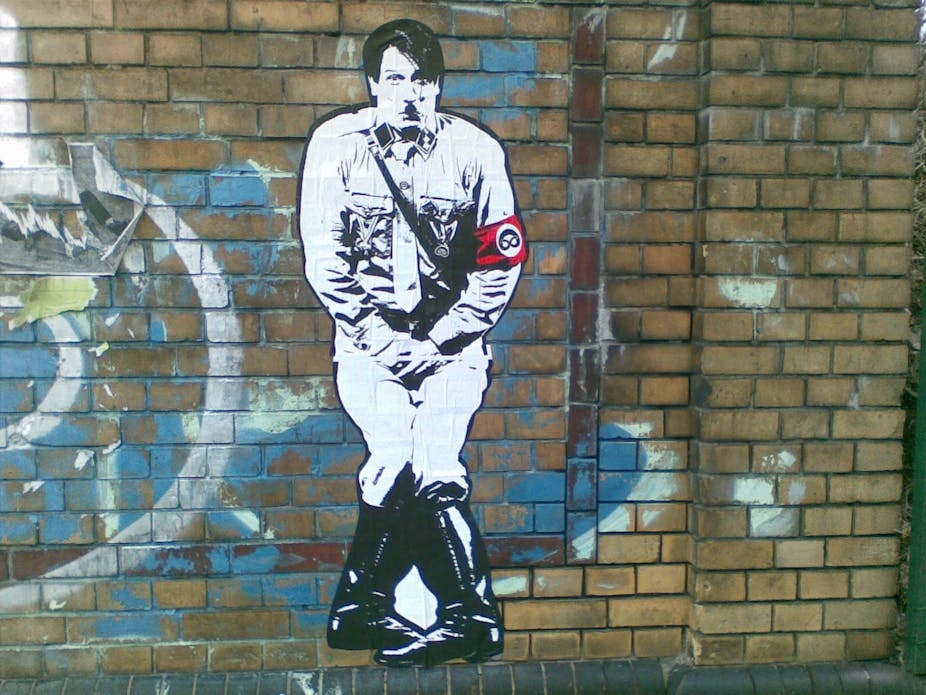Late April is always a busy time for me. This is because I, along with all other historians who study Nazi Germany, am often called upon to reflect upon the significance of two dates – April 20, 1889 and April 30, 1945 – those that mark the arrival and departure of Adolf Hitler from the world historical stage. This year, things are amped up a bit as it’s the 70th anniversary of the Nazi dictator’s suicide in his Berlin bunker.
Unless, that is, Hitler faked his own death and escaped via submarine to Argentina. Or eluded the grasp of the Allies by hiding out in the sewers of Berlin. Or fled planet Earth altogether by hitching a ride on a flying saucer to a secret Nazi refuge on the dark side of the moon. These and other conspiracy theories pertaining to Hitler’s alleged survival after World War II are outlandish, but they reveal that western culture has a had a difficult time accepting the prosaic reality of Hitler’s death.
Why do we continue to imagine Hitler being alive after 1945? For much of the post-war period, fictional portrayals of Hitler’s survival indulged the fantasy of holding Hitler accountable for his crimes. Some, such as Philippe van Rjndt’s novel The Trial of Adolf Hitler (1978), formally put him in the dock and convicted him of his misdeeds before levying the ultimate penalty of capital punishment.
Other works indulged the lust for vengeance by imposing sadistic punishments upon him, such as the cult film, Flesh Feast (1970), starring Veronica Lake as a plastic surgeon who alters Hitler’s appearance with flesh eating maggots. Or there’s Joseph Heywood’s 1987 novel The Berkut, which depicts the Soviets capturing Hitler and confining him in a cage for the amusement of Joseph Stalin.
This revenge impulse has not entirely disappeared (witness the finale of Quentin Tarantino’s 2011 film, Inglourious Basterds, where Hitler dies in hail of bullets from Jewish assassins).
Hitler the talk-show host
These days, however, we’re more likely to allow Hitler to live. In the last two decades, novels such as Steve Erickson’s Tours of the Black Clock (1989), films such as Armin Mueller-Stahl’s Conversation with the Beast (1996), and comic books, such as Walter Moers’s Adolf – die Nazi-Sau (1998) have portrayed Hitler living into the present and evading justice. Why?

Take a look at the best recent example, Timur Vermes’s 2012 bestselling novel Look Who’s Back, which features Hitler coming back to life in present-day Berlin and becoming a successful television talk-show host. It’s clear that we partly imagine Hitler’s survival in order to hold a mirror up to our own contemporary world. By showing how Hitler struggles to makes sense of today’s social, cultural and technological realities and by showing how our own world responds to his rants about them (spoiler alert: we cheer him on) Vermes’s novel gets us to think more self-critically about the present. It allows us to regard Hitler’s survival as a metaphor for the persistence of evil in our midst.
But other fictional fantasies have challenged our willingness to accept this disturbing truth. Western culture continues to produce narratives in which Hitler is eliminated from history entirely and the 20th century is spared its tragic fate. In his novel Making History (1996), Stephen Fry prevents Hitler’s birth in 1889. Or in Elleander Morning (1984) Jerry Yulsman has him being murdered while still an obscure Viennese artist in 1913. Other narratives imagine Hitler dying in a car accident in 1930, while still others have him assassinated in Operation Valkyrie on July 20, 1944.
Emblematic of the enduring interest in this premise is the newly released German film, Elser, which portrays its eponymous title character (the journeyman artisan, Georg Elser) failing by all of 15 minutes to kill Hitler with a bomb planted next to his speaker’s podium at the Munich Bürgerbräukeller on November 8, 1939 (the Führer left early to travel back to Berlin).

Counterfactual
So would history have turned out better if Hitler had somehow been eliminated from history? One might think the answer an unambiguous yes – he is the 20th century’s most notorious villain, after all – but timing and differences of national perspective complicate things. The earlier he’s done away with, the better the odds that Europe avoids disaster. By the summer of 1944 it was too late to avert most of the war’s destruction; earlier opportunities would have been far better.
National perspectives also matter. Anglo-American narratives tend to be sceptical that removing Hitler would have really improved history’s course, as even without the dictator, structural constants – say, inter-war German nationalism – might have produced comparable (or even more dangerous) right-wing demagogues. German accounts, by contrast, tend to optimistically imagine Hitler’s absence allowing the German people to steer their nation away from the brink and improve history’s path.
Not surprisingly, these competing visions of a world without Hitler respectively serve accusatory and self-exculpatory functions and reflect competing memories of the Nazi past among the former enemies of World War II. Indeed, they confirm that counter-factual narratives always tell us more about the present than the past.
In the end, it is the present that probably best explains why we keep treating Hitler like a zombie, as a figure who – though dead in reality – we bring back to life in our imagination. We need him as a moral yardstick to measure ourselves against and see how, if at all, we are learning the lessons of history and applying them to our own imperfect world.

